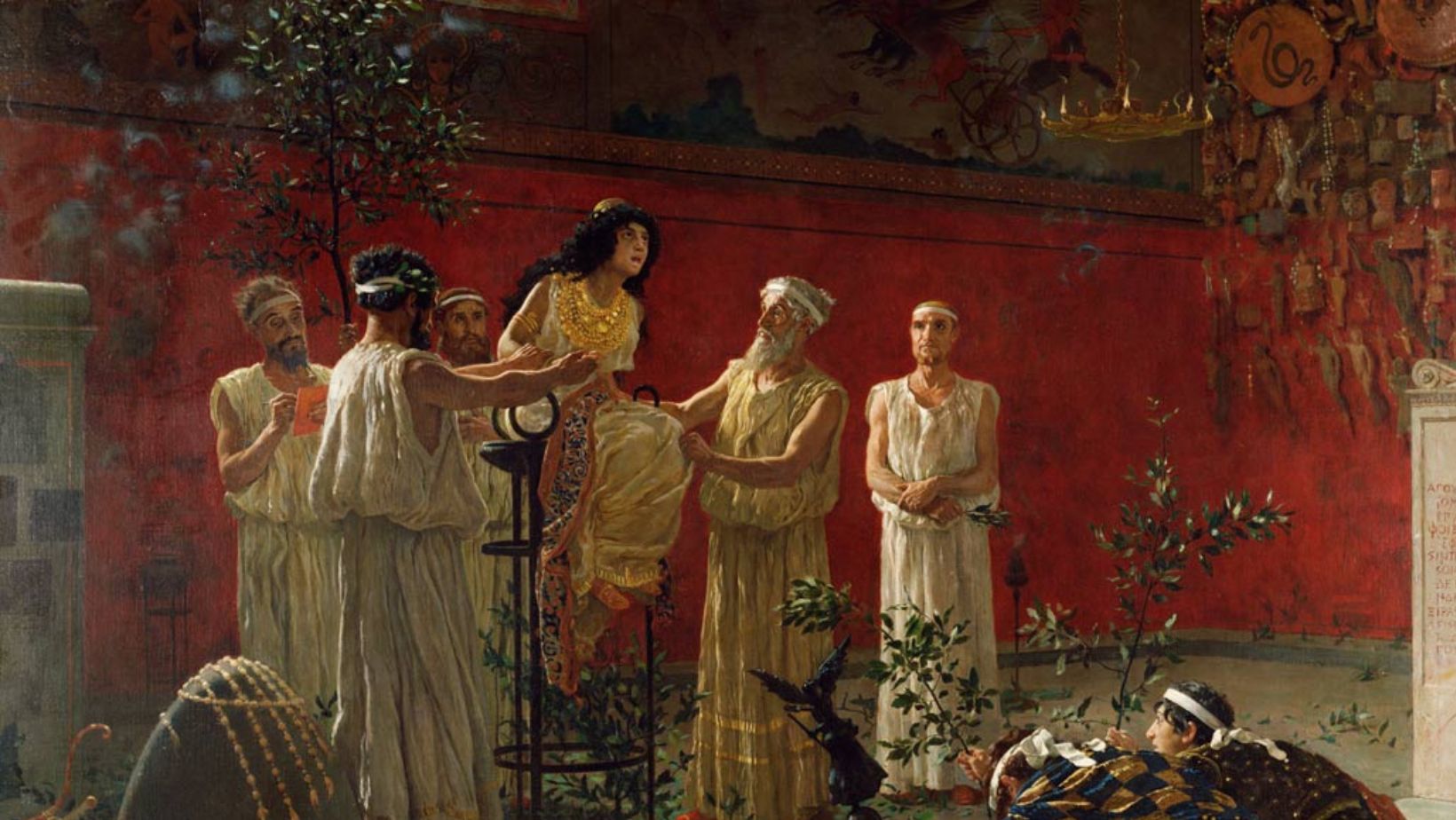The Oracle of Delphi was one of the most powerful and revered institutions in ancient Greece. Located at the foot of Mount Parnassus, it was believed to be the earthly home of Apollo, the god of prophecy. Pilgrims from all over the Greek world journeyed to Delphi to seek divine guidance on everything from war to personal matters. The priestess, known as the Pythia, would deliver cryptic answers that influenced key decisions in politics, war, and everyday life. The Oracle’s influence shaped the course of Greek history, making it an iconic symbol of ancient wisdom and divine intervention.
The Pythia: Priestess of the Oracle

The Pythia was the high priestess of the Temple of Apollo at Delphi, one of ancient Greece’s most revered religious sites. Her role was to deliver oracles, which were believed to be the voice of the god Apollo. The Pythia’s primary responsibility was to enter a trance-like state, during which she would provide prophetic messages to those seeking guidance. These messages were often cryptic and were interpreted by priests.
The Pythia became the voice of Apollo through a ritual process that was both spiritual and ceremonial. Before giving her prophecies, she would sit on a tripod over a fissure in the earth, where it was believed that vapors would rise, inducing her trance. This trance allowed her to speak in an altered state, which was thought to be Apollo speaking through her. The priests then translated her utterances into clear advice or predictions for the questioners.
The Pythia’s position was highly prestigious, as she held the power to influence political and military decisions. People from all over Greece, and beyond, traveled to Delphi to consult her. Her oracles were seen as divine truth, guiding leaders and individuals in important matters. The Pythia remained a central figure in Greek religion until the decline of the ancient world.
The Prophecies: True Insights or Clever Words?
The Oracle has been a significant figure in many ancient cultures, offering prophecies that shaped events. One of the most famous oracles was the Oracle of Delphi in ancient Greece, where the Pythia delivered cryptic predictions. These prophecies often had ambiguous meanings, leading to various interpretations. Rulers and individuals alike sought the Oracle’s guidance, believing it offered a glimpse into the future.
The interpretations of these prophecies were sometimes shaped by the listener’s desires or fears. For example, King Croesus of Lydia misinterpreted an oracle’s warning and suffered defeat. Other prophecies, like those given to Alexander the Great, were interpreted as affirming his destiny. While some saw the Oracle’s words as divine insight, others viewed them as clever, vague statements that could apply to multiple outcomes.
The outcomes of these prophecies varied. Some came true in ways that seemed almost designed, while others led to misfortune. In the end, the question remains: Were the prophecies truly divinely inspired insights or simply clever words that fit many situations? Their legacy persists as a fascinating blend of belief, interpretation, and fate.
Psychological Manipulation: The Influence of Delphi’s Prophecies
The Oracle of Delphi was one of the most powerful figures in ancient Greece, revered for her prophetic abilities. However, the prophecies she delivered were often vague and open to interpretation. This ambiguity allowed the Pythia, the priestess of the oracle, to manipulate situations by providing cryptic messages that could be shaped by the individuals seeking guidance. The psychological impact of such vague statements could lead people to interpret them in ways that aligned with their own desires or fears, creating self-fulfilling prophecies.
For example, a prophecy stating that “a great king will fall” could be interpreted in many ways, depending on the listener’s perspective. A ruler might become paranoid, taking actions that led to their downfall, believing they were fulfilling the prophecy. In this way, the Oracle’s cryptic messages could influence decisions, behaviors, and even the course of events. The vagueness of the prophecies allowed the Oracle to maintain an aura of mysticism while subtly guiding the actions of powerful individuals, making it a form of psychological manipulation.
The Geographical and Environmental Factors of Delphi
Delphi, located on the slopes of Mount Parnassus in central Greece, was surrounded by dramatic landscapes, which contributed to its mystical reputation. The ancient Greeks believed the site was the center of the world, marked by the omphalos stone. Its elevated position offered a sense of isolation, enhancing its spiritual significance. The nearby landscape, including the sacred grove of laurel trees, set the stage for the Oracle’s rituals.
One important environmental factor was the presence of natural gases in the area. It is believed that geological activity beneath the site released ethylene and other gases, which may have caused the Pythia, the priestess of Apollo, to enter a trance-like state. These gases could have induced hallucinatory experiences, helping the Oracle deliver her prophecies. The trance-like state was integral to the Oracle’s process, making Delphi a unique spiritual center in the ancient world.
The Delphic Process: Rituals and Preparation

Before delivering a prophecy, the priestess of Delphi, known as the Pythia, went through several rituals to prepare herself. These included purification rites, where she bathed in the Castalian spring to cleanse herself spiritually. She would then chew bay leaves, a symbol of Apollo, and inhale the fumes from a sacred chasm believed to be the source of divine inspiration. In a trance-like state, she would sit on a tripod, where the god Apollo was believed to speak through her.
These rituals were not just ceremonial; they were central to the accuracy and legitimacy of the prophecy. The Greeks believed that Apollo himself entered the Pythia, enabling her to communicate the will of the gods. The process ensured that the oracle’s words were considered divinely inspired and not human error. This spiritual preparation reinforced the importance of Delphi as the most powerful oracle in ancient Greece.
The cultural and religious significance of these rituals was immense. They reinforced the belief in divine intervention in human affairs. People from all over Greece, and even from foreign lands, sought the oracle’s guidance. These rituals also symbolized the connection between the earthly and divine realms, emphasizing the role of the gods in guiding decisions.
Interpretation of Prophecies: The Role of the Priesthood
In many ancient cultures, priests and priestesses were the intermediaries between the gods and the people. They played a crucial role in interpreting oracles and prophecies. These interpretations were often seen as divine guidance, shaping decisions on matters of war, governance, and rituals. Priesthoods had specialized knowledge of sacred texts, symbols, and rituals, enabling them to decipher the often cryptic messages from the gods.
However, the priesthood’s power extended beyond mere interpretation. Many priests and priestesses used their position to influence political or personal agendas. The language of prophecies could be manipulated to support the ruling class or to serve their own interests. By shaping the message, they could sway public opinion or justify actions, such as military campaigns or royal succession.
This manipulation of prophecy language was not limited to ancient times. In some cases, priests would intentionally obscure or embellish meanings to maintain their influence. This tactic ensured that the priesthood remained a central figure in society, using the divine as a tool for control. Through such practices, the priesthood often held more power than the rulers themselves.
Political Influence: How Leaders Used the Oracle
Throughout history, leaders sought guidance from oracles to make critical decisions. Kings, generals, and statesmen believed that divine advice would lead them to victory and stability. One famous example is King Croesus of Lydia, who consulted the Oracle of Delphi before going to war with Persia. He received a prophecy that “a great empire will fall,” which he misinterpreted, leading to his defeat.
Political figures often used the oracle for personal gain, shaping the message to fit their needs. Alexander the Great, for instance, visited the Oracle of Ammon in Egypt and reportedly received confirmation of his divine status. This strengthened his authority and helped consolidate his power among his followers. Similarly, Roman generals used oracles to justify military campaigns and sway public opinion.
Leaders also manipulated the oracles to legitimize their rule. In ancient Greece, some politicians influenced the priestesses of Delphi to deliver favorable prophecies, ensuring their rise to power. While the oracles were believed to be divine, their messages were often used strategically to secure political advantage, demonstrating how political figures could exploit spiritual institutions for earthly gains.
Criticism and Skepticism of the Oracle’s Power
The Oracle of Delphi was revered for centuries as a powerful source of divine wisdom. However, not all ancient thinkers accepted its influence without skepticism. Herodotus, the famous historian, questioned the validity of oracles, suggesting that they often relied on trickery. Plato, too, raised doubts, viewing the Oracle’s pronouncements as ambiguous and unreliable.
Philosophically, some argued that the Oracle’s responses were too cryptic to hold true authority. Plato, in his works, often critiqued the idea of divine intervention, preferring reason and rationality over mystical beliefs. Herodotus, in his writings, highlighted instances where oracles seemed to fail or offer misleading guidance, thus undermining their credibility. Both thinkers questioned whether the Oracle was truly divinely inspired or simply a tool for political manipulation.
While the Oracle’s influence remained strong in Greek society, such intellectual critiques persisted. Many believed that the Oracle, rather than offering divine truth, might simply reflect the biases or interpretations of those seeking answers. These criticisms remind us that even in the ancient world, not all believed in the unquestionable power of mystical forces.
Decline of the Oracle: Changing Beliefs and the Rise of Skepticism
The decline of the Oracle’s influence is closely tied to shifting societal values and evolving religious beliefs. As societies advanced, especially in Greece and Rome, rational thinking began to challenge mystical traditions. Philosophers like Socrates, Plato, and Aristotle promoted logic and reason, which undermined the Oracle’s authority. Meanwhile, the rise of Christianity brought a new belief system that did not rely on divination.
Several factors contributed to the decline of the Oracle. Political changes also played a role, with the Roman Empire taking control of former Greek city-states and imposing new religious practices. The increasing power of emperors who claimed divine authority lessened the need for external guidance. Additionally, natural disasters and the loss of credibility among Oracle priests led many to question their effectiveness.
Skepticism grew as people demanded more tangible answers to their problems. With the spread of scientific knowledge and advancements in understanding the natural world, supernatural explanations seemed less reliable. Over time, the Oracle faded into history, no longer the central figure in decision-making. The shift from divine guidance to human reasoning marked a turning point in how people sought answers.
Legacy of the Oracle: Its Influence on Modern Thought

The Oracle of Delphi, one of ancient Greece’s most revered figures, has left a lasting legacy on modern thought. Its influence spans across psychology, philosophy, and even pop culture. The Oracle was believed to channel the god Apollo, delivering cryptic messages that guided leaders and commoners alike. In modern times, scholars often view the Oracle’s words as psychological insights rather than literal prophecies.
Many philosophers, including Socrates and Plato, drew inspiration from the Oracle’s famous declaration that no one was wiser than Socrates. This message sparked deep philosophical inquiry into knowledge, self-awareness, and human nature. Psychologically, the Oracle’s riddles might be seen as early forms of introspection, encouraging individuals to look within themselves for answers. This idea resonates with modern therapeutic practices, where self-reflection is key to understanding one’s psyche.
In pop culture, the Oracle’s mystique continues to captivate. Films and books often depict oracles as sources of wisdom, embodying the balance between fate and free will. Today, the Oracle of Delphi remains a symbol of ancient wisdom, its influence felt in diverse fields that challenge the boundaries between mind, spirit, and fate.
Conclusion: The Oracle of Delphi: Prophecies or Psychological Manipulation?
The Oracle of Delphi stands as a fascinating blend of divine insight and psychological manipulation. While some argue the prophecies were genuine divine revelations, others suggest they were influenced by natural phenomena, such as intoxicating gases, or strategically manipulated by the priests for political gain. Regardless of the true source, the Oracle played a significant role in shaping ancient Greek society, offering guidance on matters of war, governance, and personal fate. Delphi’s legacy endures today, continuing to captivate imaginations as a symbol of humanity’s search for meaning and control in an uncertain world.
FAQs About The Oracle of Delphi: Prophecies or Psychological Manipulation?
What role did the priestess play in delivering the prophecies at Delphi?
The priestess of the Oracle, known as the Pythia, was the central figure in delivering the prophecies. She would enter a trance-like state, often induced by inhaling vapors from a fissure in the earth, which some believe heightened her sensitivity to psychological suggestions. The Pythia’s utterances, believed to be inspired by the god Apollo, were then interpreted by priests who often conveyed them in cryptic and ambiguous terms to seekers of advice.
How did the geographical location of Delphi contribute to its mystique?
Delphi’s location on the slopes of Mount Parnassus, considered the “navel of the world” by ancient Greeks, added to the mystical atmosphere surrounding the oracle. Its proximity to geological features such as the chasm believed to emit divine vapors, combined with the stunning natural landscape, likely influenced the psychological and spiritual experiences of those who visited, enhancing the perception of the Oracle’s power.
Did the Oracle of Delphi influence Greek politics?
Yes, the Oracle of Delphi played a significant role in shaping political and military decisions throughout ancient Greece. Leaders, including kings and generals, consulted the Pythia before undertaking major actions, from going to war to founding colonies. The ambiguities in the prophecies often allowed for flexible interpretation, giving rulers the opportunity to shape the outcomes according to their own ambitions or decisions.
How accurate were the prophecies given by the Oracle of Delphi?
The accuracy of Delphi’s prophecies has been debated. Many of the Oracle’s predictions were so vague and open to interpretation that they could be seen as self-fulfilling prophecies. In some cases, the prophecies seemed to come true due to the way they were interpreted by those seeking advice, highlighting how psychological factors, such as confirmation bias, could influence their outcomes.
What evidence suggests psychological manipulation at Delphi?
Evidence for psychological manipulation stems from the way the Oracle’s prophecies were delivered—often cryptic and phrased to create ambiguity. This allowed for broad interpretation, meaning the seekers could project their own desires and fears onto the message. Additionally, the use of trance states and possibly mind-altering substances like the vapors from the chasm could have contributed to a psychological environment where individuals felt compelled to believe in the supernatural nature of the Oracle’s words.

